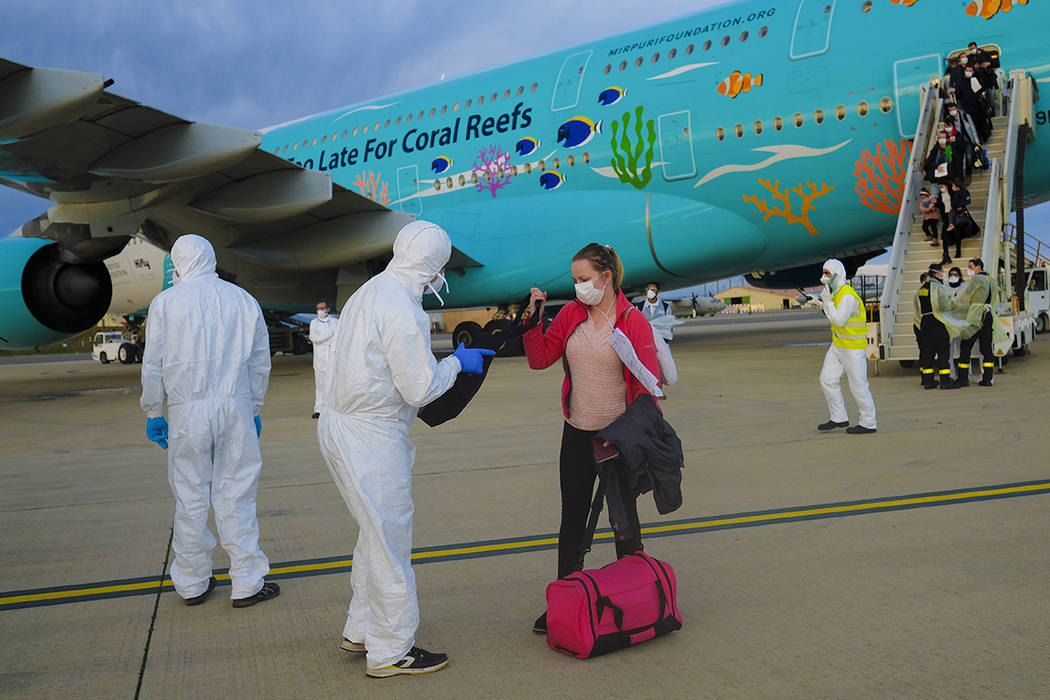Coronavirus not likely to hurt Las Vegas tourism, experts say

When the SARS virus hit the United States in 2003, Las Vegas visitation failed to take a hit.
Seventeen years later, multiple experts say it’s unlikely Las Vegas’ tourism economy will see any big shake-up from the spread of the coronavirus, which belongs to the same family of viruses.
“We could see some risk to Strip visitation … particularly around the important Chinese New Year holiday,” SunTrust Robinson Humphrey analyst Barry Jonas said in a Jan. 27 note. But “as it stands now, we see very limited potential direct impact (to Las Vegas operators).”
The coronavirus was first discovered in Wuhan, China, and has since spread around the globe. So far, the respiratory virus has infected more than 20,000 people worldwide and killed more than 400.
Lunar New Year
Monique Clements, director of marketing and business development at the Shops at Crystals, said the outbreak came at a pivotal moment for tourism in Las Vegas, with the Lunar New Year starting Jan. 25.
“Over the years, we have seen an increase in demand for our Chinese New Year celebrations from shoppers of all backgrounds,” Clements said.
The Las Vegas Convention and Visitors Authority was unable to provide data on visitation during the Lunar New Year because the authority reports on occupancy levels only from the previous month and does not extract data from visitors on the reasons they’re visiting.
“It’s too early to determine what, if any, impact the coronavirus out of Wuhan, China, would have on visitation in Las Vegas,” said LVCVA spokeswoman Lori Kraft-Nelson.
Jonas said baccarat play by Asian tourists is often heavily concentrated around events like the Lunar New Year. While these gaming numbers could take a hit, the overall impact on Las Vegas will likely be nominal, Jonas said.
Both MGM Resorts International and Caesars Entertainment Corp. have “some exposure to high-end baccarat play,” but Jonas said expectations around the Asian VIP visitation have been low this year. MGM CEO Jim Murren told investors in July that baccarat made up only 6 to 7 percent of Strip properties’ cash flow.
Additionally, Jonas said other major tourism drivers — including conventions, the NFL draft and Raiders games — should “more than offset any Asian (tourism) weakness.”
According to LVCVA data, tourists from China made up the fifth-largest group of international visitors in 2018, accounting for 4 percent of total international visitation in Las Vegas.
Impact on resorts
While Macao casinos have seen a dip in visitation because of the outbreak, Las Vegas resorts are unlikely to say the same, according to Jonas.
“If you look at room rates before the coronavirus was announced and (room rates) now, there hasn’t been a noticeable deceleration in rates,” he told the Review-Journal. “In some areas, you’ve seen rates accelerating for some periods.”
Jonas said he expects the coronavirus epidemic to play out similarly to the H1N1 swine flu scare of 2009 and the SARS outbreak, both of which were “largely nonevents” for most regional operators.
Michael Weaver, a Wynn Resorts Ltd. spokesman, said Wynn Las Vegas has “not experienced any impact on occupancy or visitation,” but company officials are continuing to “closely monitor the situation and are prepared to implement any directive” from the Southern Nevada Health District or the Centers for Disease Control and Prevention.
Caesars spokesman Richard Broome said the company is “not experiencing a notable impact on business at this time” and is encouraging employees to use proper hygiene to combat both the flu and the coronavirus.
Las Vegas Sands Corp. spokesman Ron Reese said the company is “following the guidance of the appropriate government entities and will continue doing so.”
Representatives of MGM and Red Rock Resorts declined to comment. A representative of Boyd Gaming Corp. did not return requests for comment.
Consumer spending
A Jan. 27 report from Wells Fargo found that U.S. consumer spending is unlikely to take a hit because of the outbreak, which bodes well for Las Vegas’ tourism industry.
Researchers looked back at the 2002-03 outbreak of SARS, a virus that killed 800 people globally and infected 8,000, and found that there was “an observable drop in air-travel spending.” However, it didn’t take long before U.S. consumers resumed travel, according to the report.
And while consumer confidence “clearly took a hit” in that period, researchers found that dips in discretionary spending were short-lived.
“Consumers eventually get frugal fatigue,” the report reads.
Overall, the researchers found that although it’s too early to know how far the coronavirus will spread, U.S. consumer spending will “likely not be materially affected, assuming that the current episode does not become more widespread than the SARS outbreak.”
The Review-Journal is owned by the family of Las Vegas Sands Corp. Chairman and CEO Sheldon Adelson.
Contact Bailey Schulz at bschulz@reviewjournal.com or 702-383-0233. Follow @bailey_schulz on Twitter.